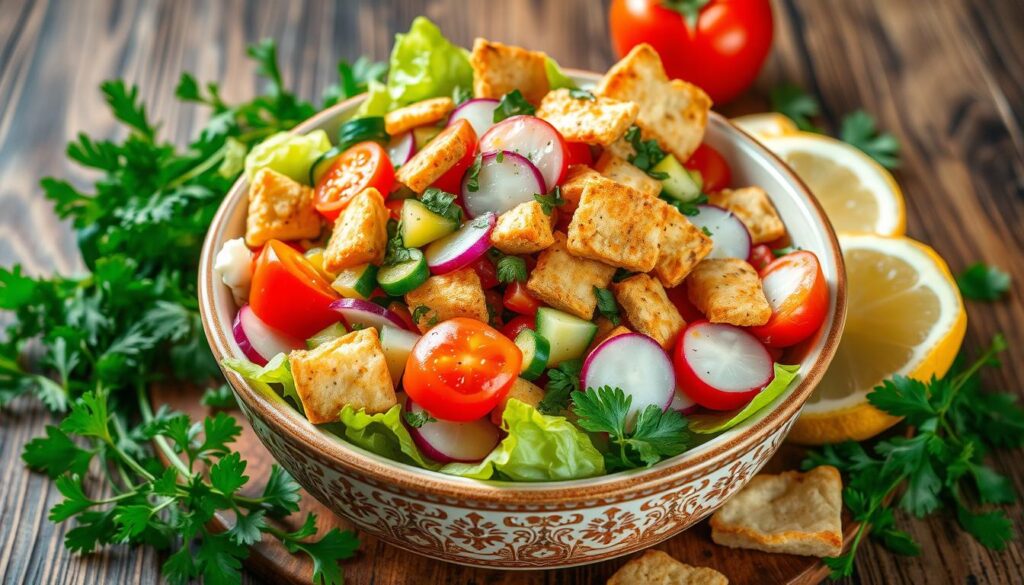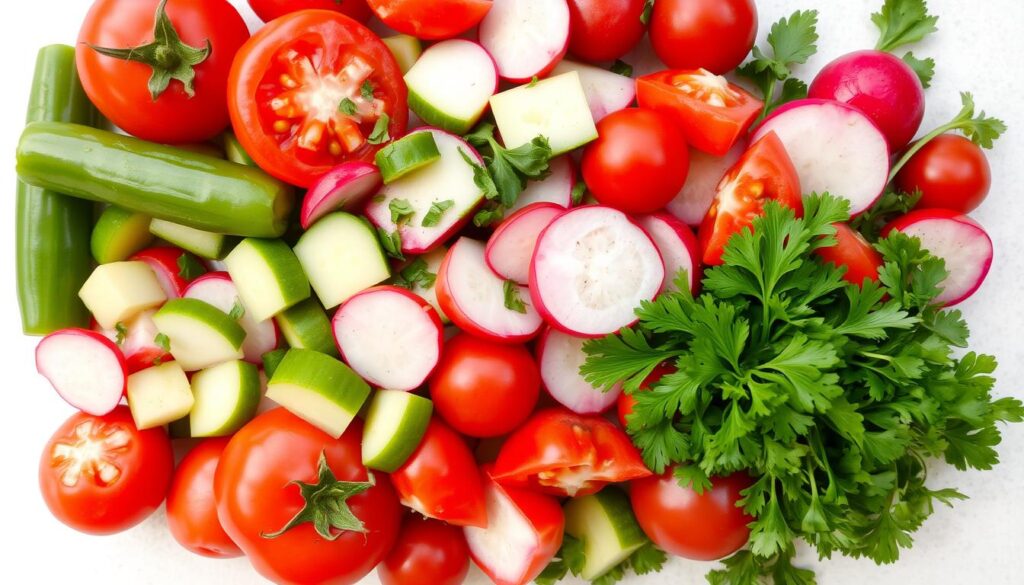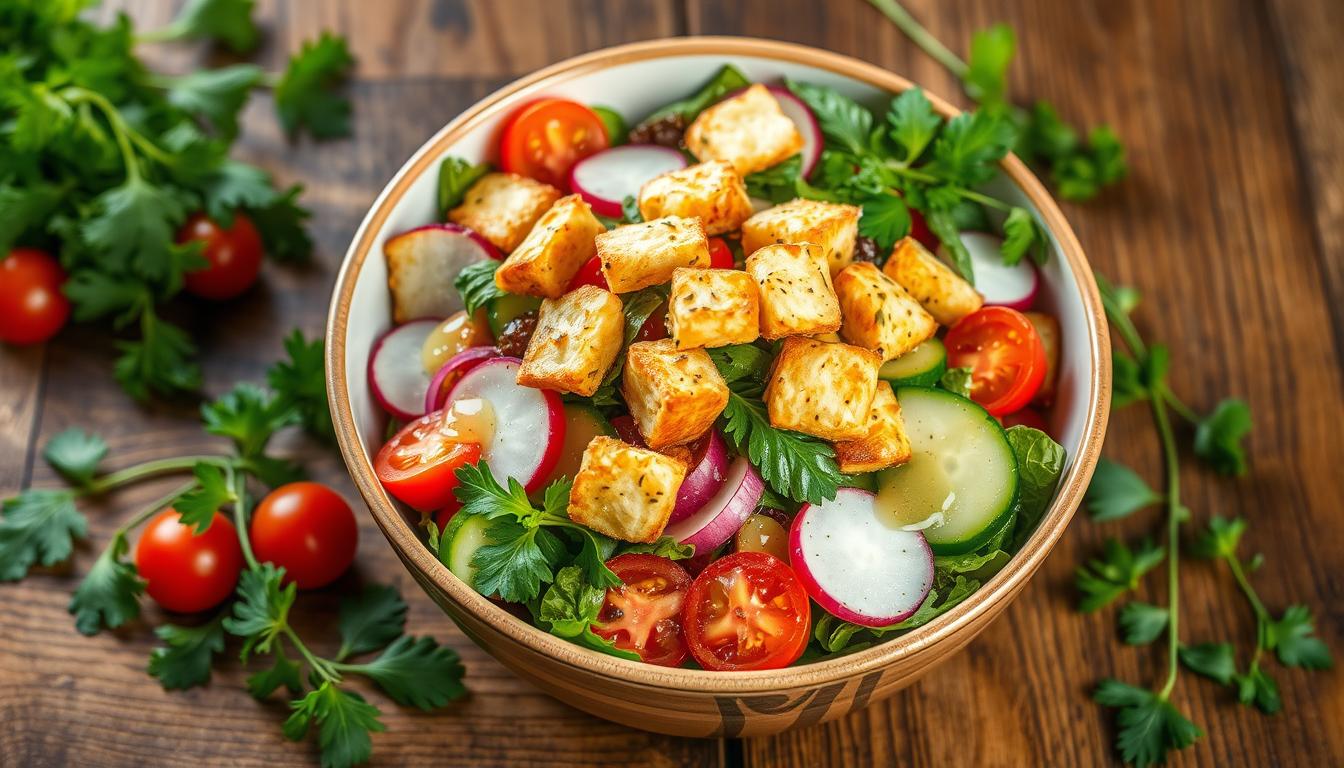Growing up in a Lebanese home, the smell of fresh pita bread was always there. It was mixed with the bright tastes of homemade fattoush salad. The tangy dressing, crunchy pita, and fresh veggies and herbs were a treat for my senses.
Now, as an adult, I’m excited to share this Middle Eastern favorite with you. I hope it brings you the same joy and memories it has for me.
Table of Contents
Understanding Fattoush: A Middle Eastern Bread Salad Tradition
Fattoush is a favorite salad in the Middle East and Mediterranean. It started in Northern Lebanon’s rural areas. Farmers used leftover pita bread to make it. Now, it’s a refreshing side dish or a light meal.
Origins and Cultural Significance
Fattoush comes from the Levant, including Lebanon, Syria, Jordan, and Palestine. It was made from simple, affordable ingredients. Sumac, a tangy spice, is key to its flavor.
Traditional Role in Lebanese Cuisine
In Lebanese food, Fattoush is a vibrant salad with a mix of flavors. It’s versatile, with changes for different seasons and places. It goes well with grilled meats, hummus, and stuffed grape leaves.
Modern Interpretations
Fattoush has changed but kept its core. Now, it might have bell peppers, radishes, or grilled chicken. But it still has crispy pita and tangy dressing. This makes it popular worldwide.

“Fattoush is more than just a salad; it’s a vibrant expression of the rich culinary tradition of the Middle East.”
Essential Ingredients for an Authentic Fattoush Salad
Making a real fattoush salad needs the right mix of fresh, tasty ingredients. At its core are juicy tomatoes, crunchy cucumbers, and a blend of greens like romaine lettuce or little gem lettuce. Aromatic radishes and fresh herbs like mint and parsley add color and a fresh taste.
The dressing is what makes the salad special. It’s made with extra virgin olive oil, tangy lemon juice, earthy sumac, and sweet pomegranate molasses. This mix of flavors coats the salad, making it taste fresh and zesty.
Fattoush can also have extra ingredients like arugula, mâche, or green onions. But the must-have is pita chips. They add crunch and soak up the dressing’s flavors.

“Fattoush salad is a celebration of the vibrant produce and bold flavors that define the essence of Middle Eastern cuisine.”
Choosing the freshest vegetables, the most fragrant herbs, and top-quality olive oil makes a true fattoush salad. It takes you on a flavorful trip through the Levant’s rich food traditions.
Making Perfect Crispy Pita Croutons
Elevate your Fattoush salad with homemade crispy pita croutons. The key to achieving the perfect crunch lies in the way you prepare and bake the pita bread. Follow these simple steps to craft toasted pita chips that will add irresistible texture and flavor to your Middle Eastern-inspired dish.
Preparing the Pita Bread
Start by cutting whole grain pita bread into bite-sized squares or triangles. The pita pieces should be approximately 1-inch in size for the best texture. Aim for around 2 whole pitas, which should yield 8 to 10 ounces of pita croutons.
Seasoning and Baking Techniques
Preheat your oven to 375°F (190°C). Spread the pita pieces on a large baking sheet and drizzle with a couple tablespoons of olive oil. Toss to evenly coat the pita. Season the pita croutons with a sprinkle of salt, black pepper, and a dash of sumac for an authentic Middle Eastern touch.
Bake the seasoned pita pieces for 10-12 minutes, flipping them halfway through, until they are golden brown and crispy. For an even quicker method, you can also air fry the pita croutons at 350°F (175°C) for 3-5 minutes, shaking the basket occasionally, until they reach the desired crispness.
Storage Tips for Croutons
Allow the toasted pita croutons to cool completely before storing them in an airtight container at room temperature. They will maintain their crunchy texture for up to 2 days, making them the perfect make-ahead component for your Fattoush salad. Simply add the crispy pita pieces to the salad just before serving to preserve their satisfying bite.
The Secret to the Perfect Sumac Dressing
To take your fattoush salad to the next level, you need the perfect sumac dressing. This dressing is what makes the salad pop, adding a tangy Middle Eastern flavor.
The secret to a great sumac dressing is mixing the right ingredients. You’ll need extra virgin olive oil, fresh lemon juice, minced garlic, pomegranate molasses, apple cider vinegar, and sumac spice.
To make it, just mix everything in a bowl. Whisk it well or use an immersion blender to get a smooth dressing. This dressing will cover your salad greens and pita croutons perfectly.
Sumac, a Middle Eastern spice, is the dressing’s star. It adds a tart, lemony taste that’s hard to find elsewhere. A single bottle of sumac, costing about $7 on Amazon, can make many batches of dressing.
“The secret to an authentic fattoush salad lies in the sumac dressing. Its tangy, lemony flavor is the perfect complement to the crisp greens and pita croutons.”
For the best taste, make the dressing ahead of time and keep it in the fridge for up to a month. This lets the flavors mix and get stronger, making the dressing even better for your salad.
With your sumac dressing ready, you’re set to make a fattoush salad that feels like a trip to the Middle East. This vibrant, tasty dish is a great, healthy choice for your meals.
Fresh Vegetables and Herbs Selection Guide
To make a delicious fattoush salad, picking the right vegetables and herbs is crucial. Choose ripe tomatoes, crisp cucumbers, and fresh lettuce. These will enhance the salad’s flavor with the tangy sumac dressing and crunchy pita croutons. English or Persian cucumbers are best for a nice texture.
Choosing the Best Produce
When you’re shopping for your salad ingredients, look for these:
- Tomatoes: Go for plump, juicy tomatoes with a deep red color. Cherry or grape tomatoes are perfect for this salad.
- Fresh vegetables: Choose crisp, green lettuces like romaine or mixed greens. Add crunch with radishes, bell peppers, and scallions.
- Parsley and mint: These bright, aromatic herbs are key for authentic fattoush flavor. Pick vibrant bunches with no wilting.
Seasonal Variations
Use seasonal produce to make your fattoush salad even better. In summer, add juicy watermelon or fresh corn kernels. For fall, roasted butternut squash or pomegranate seeds add sweetness. In spring, tender asparagus spears or peas add a nice crunch.
Proper Storage Methods
To keep your salad ingredients fresh, follow these tips:
- Wash and dry all vegetables well before refrigerating them in airtight containers or resealable bags.
- Store fresh herbs in water or wrap them in damp paper towels to keep them fresh.
- Use a salad spinner to make sure your greens and other produce are dry before assembling the salad.
| Ingredient | Storage | Shelf Life |
|---|---|---|
| Fresh vegetables (tomatoes, cucumbers, lettuce, etc.) | Refrigerated in airtight containers | 3-5 days |
| Parsley | Wrapped in damp paper towels, stored in the fridge | 3-5 days |
| Mint | Stored in water in the fridge | 5-7 days |
Step-by-Step Instructions for Fattoush Salad with Crispy Pita Croutons
Enjoy the lively tastes of the Mediterranean with Fattoush, a Lebanese salad. It’s a mix of crunchy pita croutons, fresh veggies, and a zesty sumac dressing. Follow these easy steps to make your own Fattoush at home.
Start by making the pita croutons. Cut or tear pita bread into small pieces. Toss them with olive oil, sumac, and salt. Spread them on a baking sheet and bake until golden, about 5-7 minutes. Let them cool.
Then, chop your veggies. Cut tomatoes, cucumbers, red onions, and radishes into small pieces. Tear romaine lettuce into smaller bits. Put the chopped veggies in a big bowl and add some sumac dressing. Toss gently and let it sit for 15 minutes.
| Ingredient | Quantity |
|---|---|
| Romaine lettuce | 1 head, chopped |
| Tomatoes | 2 cups, diced |
| Cucumbers | 1 cup, diced |
| Red onion | 1/2 cup, diced |
| Radishes | 1/2 cup, sliced |
| Pita bread | 2 pieces, toasted into croutons |
| Sumac dressing | 1/4 cup |
Just before serving, add the crispy pita croutons to the veggies. Toss gently to mix. Drizzle the rest of the sumac dressing over it. Top with fresh parsley or mint leaves.
Enjoy this Mediterranean cuisine inspired Lebanese salad right away. It’s a perfect mix of crispy, fresh, and tangy. The vibrant colors and textures make Fattoush a feast for the senses.
“Fattoush is a celebration of the season’s best produce, elevated by the tangy sumac dressing and the crunch of toasted pita. It’s a dish that embodies the essence of Mediterranean cuisine.”
Nutritional Benefits and Dietary Information
Fattoush salad is not just tasty but also very healthy. It has about 230 calories per serving. This makes it a great choice for those on a healthy Mediterranean diet.
A serving of fattoush salad has 23g of carbs, 5g of protein, and 15g of fat. The carbs come from the pita croutons. The protein is from the veggies and herbs. The fat is from olive oil, which is good for your heart.
Health Benefits of Key Ingredients
Fattoush salad is packed with vitamins and minerals. Romaine lettuce is low in calories but full of vitamins A and K, folate, and fiber. Tomatoes, cucumbers, and radishes add antioxidants and anti-inflammatory compounds.
The herbs like parsley and mint add to the salad’s health benefits. They help with digestion and boost your immune system. This salad is vegetarian and can be vegan by leaving out the honey. It’s perfect for a healthy, plant-based meal that follows the healthy Mediterranean diet.
| Nutrient | Amount per Serving |
|---|---|
| Calories | 230 |
| Carbohydrates | 23g |
| Protein | 5g |
| Fat | 15g |
| Vitamin A | 80% DV |
| Vitamin C | 35% DV |
| Potassium | 450mg |
| Fiber | 6g |
“Fattoush salad is a nutritious and refreshing addition to a healthy Mediterranean diet, offering a delightful balance of flavors and a wealth of essential nutrients.”
Make-Ahead Tips and Storage Recommendations
For the best results, prepare the components of your Fattoush salad separately. Assemble just before serving. This keeps the fresh vegetables and crispy pita croutons crisp and fresh.
The flavorful sumac dressing can be made up to a month in advance. Store it in the refrigerator. This way, you have the key flavors ready to go. Wash and chop your fresh vegetables, like Romaine lettuce, tomatoes, cucumbers, and herbs, up to a day ahead. Store them separately in airtight containers to keep their texture and flavor.
Prepare the pita chips up to two days in advance. Store them at room temperature in an airtight container. When ready to serve, toss the salad ingredients together. Sprinkle the crispy pita croutons on top. If you have leftovers, keep the dressed salad separate from the pita chips. Consume within 12 hours for the best taste and texture.
